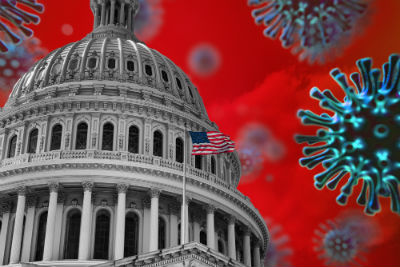
U.S. Sen. Mark R. Warner (D-VA) has introduced legislation to promote federal worker safety and ensure that employees and their families are well informed about COVID-19 protective measures in the workplace.
The Chai Suthammanont Remembrance Act – named after a Virginia federal worker who passed away from COVID-19 complications – would require federal agencies to publish and communicate their COVID-19 safety plans, setting a precedent for increased agency transparency around critical safeguards.
Joining Sen. Warner in introducing this legislation are U.S. Sens. Tim Kaine (D-VA), Ben Cardin (D-MD), Chris Van Hollen (D-MD), and Sherrod Brown (D-OH).
The bicameral legislation was also introduced in the House of Representatives by U.S. Rep. Gerry Connolly (D-VA) and passed by the House Committee on Oversight and Government Reform on May 13.
It now awaits a vote on the House floor.
“Civil servants should not have to sacrifice their lives to serve their country, as was the tragic case for Chai Suthammanont, a kitchen worker at Marine Corps Base Quantico who passed from COVID-19 complications,” said Sen. Warner. “The Chai Suthammanont Remembrance Act will help ensure that federal agencies have workplace safety plans in place to protect public servants as they continue to provide essential government services and assistance. This bill will also set an important precedent for increased transparency so that agencies are better prepared to publish and disseminate safety plans in a future emergency.”
“No one should have to fear for their life or safety while working, especially during this pandemic,” said Sen. Kaine. “We must ensure that every federal workplace implements comprehensive plans to protect federal workers. I’m proud to introduce this legislation to keep employees and their families informed and safe during these unprecedented times.”
“Federal workers continue to be on the front lines of this pandemic and deserve a safe workplace,” said Sen. Cardin. “As the nation’s single largest employer, the federal government should set the standard for making the workplace safe for everyone so that workers can continue to meet their missions for the American people.”
“No one should have to pick between their life and livelihood. Our federal employees work tirelessly to provide vital services to the American people. This legislation will help ensure that their safety is a priority, so these dedicated civil servants can continue to assist Americans day in and day out,” said Sen. Van Hollen.
“The frontline federal employees that have reported to work throughout this ongoing pandemic deserve gratitude, protection, and support. With the emergence of the Delta variant of the COVID-19 virus, we must recognize and act on the risks these workers face during this health emergency. There’s no reason why civil servants should have to worry about whether their work environment is safe enough for them to carry out their duties. This legislation is a step in the right direction to ensuring that federal employees are not left in the dark with regard to workplace safety,” said Sen. Brown.
Chai Suthammanont – a kitchen staff worker at a childcare facility on Marine Corps Base Quantico – died from coronavirus-related complications in 2020 after being exposed to COVID-19, likely in the tight kitchen space he shared with additional staff.
Confusion and uncertainty regarding best practices and agency policies, as well as a general lack of communication with federal workforce staff, likely contributed to his death.
Nearly 14 months after Chai’s death, the delta variant – a highly contagious strain of COVID-19 – has continued to spread at an alarming rate among unvaccinated individuals, putting the Commonwealth at risk for another deadly COVID-19 surge.
The legislation introduced by the senators would require federal agencies to develop the kind of workplace safety plan that could have reduced Chai’s potential exposure to COVID-19.
“COVID-19 is still with us. While infection and death rates have thankfully dropped dramatically from the devastating numbers we had earlier this year, we cannot be complacent. New variants and slowing vaccination rates mean workers are still at risk. We thank Sen. Warner for his leadership in ensuring our federal workers and their families are safe,” said Juley Fulcher, worker health and safety advocate, Public Citizen.
“As federal agencies prepare to reopen buildings to full capacity and phase out the incredibly successful policy of maximum telework, Sen. Warner’s effort to ensure federal employees feel safe at work is well-timed. The Chai Suthammanont Remembrance Act sends a strong message to agency leaders that employee safety is paramount and that civil servants deserve a work environment that incorporates the lessons learned from the pandemic and protects federal workers as they continue to serve the American people,” said Tony Reardon, president, National Treasury Employees Union.
“The International Federation of Professional and Technical Engineers applauds and thanks Senator Warner for reintroducing this much needed legislation, as it will help to ensure that federal workers returning to work will have the information necessary to feel that they are entering a safe workplace. We are hopeful that Congress will approve this legislation and send to President Biden for his signature,” said Matt Biggs, secretary-treasurer/legislative director, IFPTE.
“The National Federation of Federal Employees is proud to support the Chai Suthammanont Remembrance Act in honor of Mr. Suthammanont, who passed away due to COVID-19 after exposure to the virus in his workplace. This bill is necessary to ensure the safety of all federal employees who answer the call to serve their country during this pandemic and any future crises,” said Randy Erwin, president, NFFE.
According to this legislation, any workplace safety plan disseminated by a federal agency must include:
- Procedures for testing, contact-tracing, and vaccine administration for federal employees, along with other mitigation efforts, including cleaning protocols, implementation of occupancy limits, and efforts to ensure proper mask-wearing, social distancing, and individual hygiene at worksites.
- Efforts to protect employees who travel for their official duties or who work outside of federal office buildings.
- Safety and health requirements for visitors to federal facilities.
- Contingency options and workplace flexibilities for those at high-risk of contracting the coronavirus, or who live in a household with individuals at high-risk.
- Protocols for vaccination, including leave policies for individuals who experience severe side-effects as a result of vaccination.
- Efforts to ensure continuity of agency operations, including contingency plans should there be a surge in coronavirus cases.
- Applicable Inspector General Hotline information that employees can use to report instances when agencies do not follow the plan.
Text of this legislation is available here.










